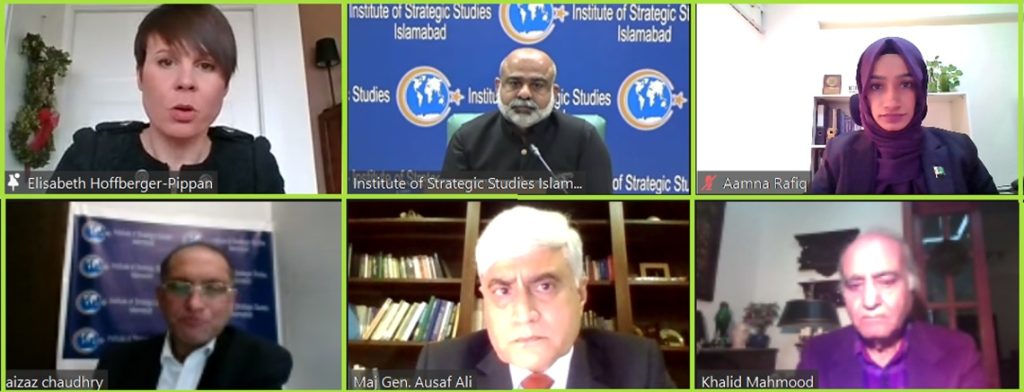Press Release
Webinar
on
“Lethal Autonomous Weapons Systems (LAWS) and State Behaviour: Global and Regional Implications”
April 7, 2021

The Arms Control and Disarmament Centre (ACDC) at the Institute of Strategic Studies Islamabad (ISSI) hosted a webinar on “Lethal Autonomous Weapons Systems (LAWS) and State Behaviour: Global and Regional Implications” on April 7, 2021. The webinar was attended by various distinguished national and international experts and moderated by Malik Qasim Mustafa, Director ACDC-ISSI.
While welcoming the guests, Ambassador Aizaz Ahmad Chaudhry, Director General ISSI, said that the development of LAWS is fast outpacing the speed of the international negotiation process while states are extremely divided on various aspects of LAWS. He opined that instead of relying on the development of an international regulatory framework, states should explore the options of bilateral and regional arms control diplomacy in the realm of LAWS.
Earlier in his introductory remarks, Malik Qasim Mustafa, Director ACDC-ISSI, said that the increasing weaponisation of artificial intelligence is generating insecurities, fears and present complex security challenges for states. The development, production and use of LAWS have already raised moral, legal and responsibility issues. Major powers like the US, China, Israel, South Korea, Russia and the UK are developing autonomous weapon systems. In South Asia, India is investing in the development of various autonomous weapons which could undermine the strategic stability in the region.
Ms. Aamna Rafiq, the Research Associate at the ACDC-ISSI, provided a comprehensive analysis of the ongoing debate on LAWS and issues in the CCW. While more than 100 states are developing LAWS, serious issues like the applicability of International Humanitarian Law (IHL) on LAWS, the complexity of human-machine interaction and lack of consensus on developing the legally binding regulation or restrictions are hindering the development of international regime for LAWS, she stated. She suggested that state parties should utilise the upcoming 2021 CCW Review Conference as an opportunity to save the entire process of the United Nations Group of Governmental Experts (UNGGE) on LAWS from a deadlock.
While expressing her views on “Great Power Competition for LAWS: Global Implications,” Dr. Elisabeth Hoffberger-Pipan, Post-Doctoral Associate, German Institute for International and Security Affairs, Berlin, said that all regions and states have collective responsibility for the regulation of LAWS. The US is framing the narrative around the fact that LAWS will enhance the accuracy, interoperability and efficiency of military operations. However, the European Union has expressed serious concerns over the deployment and use of LAWS and encouraging states to retain human control. She also opined that there is a possibility and option of an international legal instrument, binding or non-binding, outside the CCW.
In his remarks on the impacts of LAWS on strategic stability, Major General (Retd) Ausaf Ali, Advisor, Strategic Plans Division (SPD), Pakistan, said that LAWS along with hypersonic and laser weapons would reduce the time for strategic decision-making and diplomatic options. They can trigger crisis instability and conflict escalation to a nuclear level. The integrity of these weapons is also highly questionable as they are extremely vulnerable to cyberattacks, reprogramming and jamming. Furthermore, the development and production of LAWS have already triggered a global arms race and he feared that these systems could also proliferate to non-state armed groups.
The presentations were followed by an interactive session in which national and international experts together with the ISSI research faculty actively participated. Concluding the webinar, Ambassador Khalid Mahmood, Chairman BOG ISSI, said that the LAWS are producing destabilising effects on international peace and stability. The development of LAWS is irreversible; however, the existence of an international regulatory framework will increase the moral pressure on proliferating countries in future.












